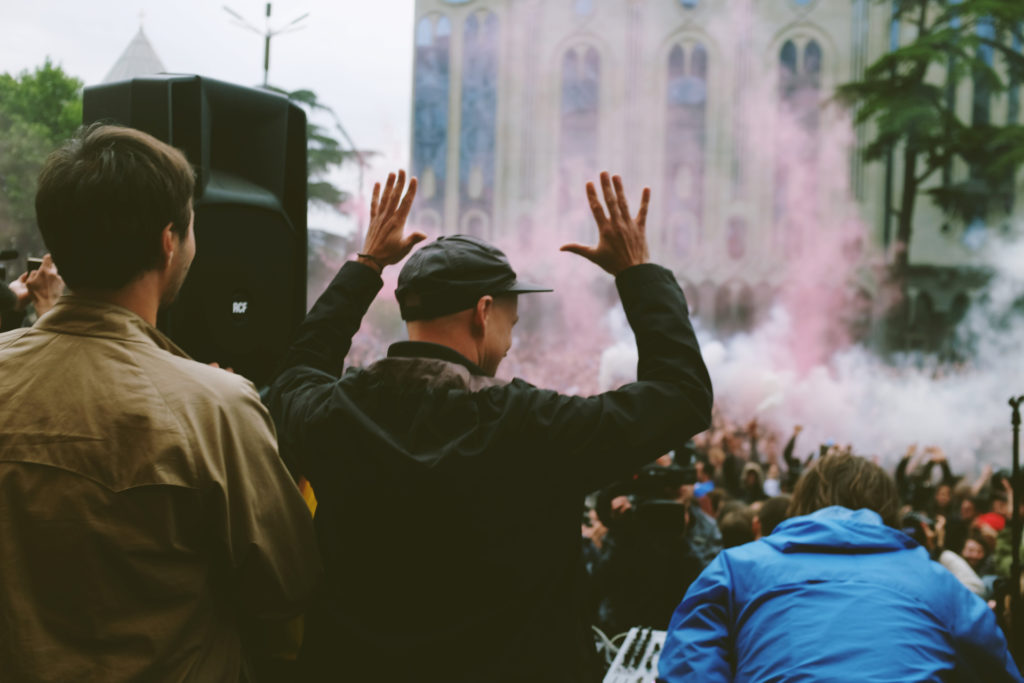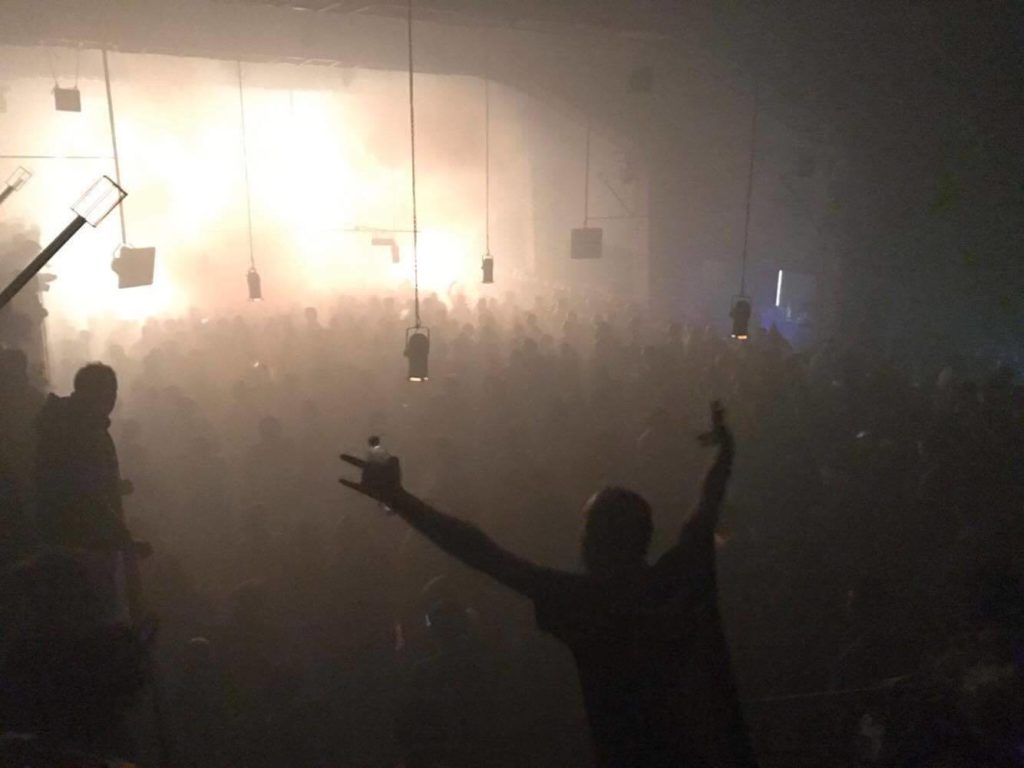The new organisation saving Tbilisi club culture

“Before the pandemic, around 15-20 international acts would DJ in Tbilisi each weekend,” recalls Georgian nightlife industry stalwart David Lezhava, managing director of the recently formed Cultural and Creative Industries Union of Georgia. “But some local DJs bring more listeners than an international star ever could.”
It’s the kind of local pride night creators in other parts of the world dream of. And, as any traveller who has been on a dance floor pilgrimage to Tbilisi can verify, fully deserved. “Tbilisi has become a major international electronic music destination lately,” Lezhava continues. “The club culture has been exemplary and the works of local artists have laid the foundation for new cultural processes in the country.”
Electronic music and nightlife culture was certainly having a moment in Georgia’s capital in the 20-teens. A creative boom was busy expressing itself in the growing number of bars, nightclubs, music venues and multi-purpose cultural spaces dotted across the vibrant cityscape, and the world was taking notice, with techno-tourists flocking to Tbilisi for bucket-list nightclubs like Bassiani, nestled in the bowels of a Soviet-era football stadium on the outskirts of the city, and finding themselves equally captivated by the surrounding energy of a city in the midst of a cultural forward charge, driven by local creators and spearheaded by electronic music culture.

Little more than 20 years old, the Georgian electronic music scene remains a relentlessly high quality one. Subjective though the statement may be, enough music makers and lovers have concurred for this writer to feel confident in saying it’s actually hard to find bad music on the Tbilisi nightlife circuit. “We had superb first generation of producers in Georgia, and our electronic music scene was built around their taste.” Lezhava explains. “The clubs were tiny, but with top quality music, and as the scene kept developing we went from tiny clubs to huge spaces like Bassiani, but the quality of music was kept. The people in charge in Tbilisi are creative people; this is what makes our scene so good.”
Tbilisi club culture made international headlines in 2018, when around 15,000 young Georgians gathered outside parliament to defend it and what it symbolised, as a safe space of tolerance and progressive values – a lightening quick response to aggressive raids the night before which they felt targeted not only their music but their way of life. Evocative videos raced across mainstream media and internet backchannels of techno blasting across stone structures and moving bodies, dancers holding posters in defence of love, tolerance and dancing, and the vivid red smoke of flares wafting defiantly overhead.
To outsiders, it looked like here was an electronic music scene that knew its own value, and that could defend itself. And yet, lacking any formal support or even acknowledgment from the government, nor any organisation directed towards securing it, Georgian club culture found itself in immediate peril and without aid within weeks of last year’s national lockdown. David Lezhava, together with Naja Orashvili, owner of the aforementioned Tbilisi techno haven Bassiani, decided to act. “We knew we were in tough situation,” says Lezhava. “And that’s when the association was born.” The pair, aided by a growing number of motivated industry stakeholders, has mobilised, organised and formalised the representation and protection of Georgian electronic music and club culture through a non-government, non-profit association called the Cultural and Creative Industries Union of Georgia (CCIU Georgia).
One year since its inception, CCIU Georgia can count itself among the pandemic’s silver linings, a clear success story in advocacy, born from adversity. Beginning life in the wake of lockdown as a 60-member facebook group of concerned stakeholders, by mid April CCIU Georgia was an official organisation under the stewardship of Orashvili and Lezhava, meeting periodically in the dormant club spaces of the city to keep dialogue flowing and develop an action plan. Like countless clubs across the world, Georgia’s venues were facing bankruptcy, with no aid from the government forthcoming. “Every month or so we would get together with the representatives from the electronic music scene: djs and everybody from the field, discussing the issues. Where our goal was to advance and lobby the interests of local club culture and nighttime creative industries. These early discussions became the basis of our plan.” The most pressing need for the shuttered industry was of course money, so the association’s first official project was to establish the Tbilisi outpost of United We Stream.

United We Stream – which streams DJ sets from otherwise empty clubs and other interesting cultural spaces – launched as a fundraising service for Berlin clubs within days of Germany’s Covid-19 lockdown, and rapidly blossomed into a global phenomenon, providing an international cultural platform in the digital space through which to crowdsource funds for struggling club venues and industry workers, simultaneously raising the profile of local scenes, spaces and artists. In May of 2020 Tbilisi became the 11th city to join the UWS family, which now spans 117 cities. “We’ve broadcast 19 separate shows so far, one of which was a 15-hour marathon in January,” Lezhava states proudly, “and showcased around 100 local artists.” Just days ago Tbilisi notched up its 19th broadcast, from MTKVARZE, a techno haven within a distinctive 1950s building on the bank of Tbilisi’s Kura River, and in early April will stream to the world from Lisi Rest and Tbilisi State Academy of Arts. UWS Tbilisi has raised around 30,000 GEL for venues and artists so far.
By December of last year, despite having also raised an additional sums for club nightlife workers through private funding, the situation reached a critical point. “We were seeing clubs go bankrupt right and left,” Lezhava remembers, “and there were not enough private funds to go around. As more and more clubs went dark, we realised we needed additional help, and so we approached the government.” Why hadn’t the government been CCIU Georgia’s first port of call instead of last resort? In fact, this was not the first time the Georgian electronic music community had reached out for state aid, having previously sent a statement via letter, signed by a broad cross-section of the industry, which was never responded to. Empowered and inspired by global knowledge exchange through VibeLab’s internationally collaborative practical guide to reactivating nighttime economy and culture, the Global Nighttime Recovery Plan (GNRP), the CCIU tried again, and differently.
“Well, on the second round, we didn’t just write a letter, we wrote the whole plan,” Lezhava says. “We approached the government via the City Hall with what we called ‘The 4 Point Plan: Electronic Music and Club Culture Recovery Fund’. It detailed how to save the electronic music scene, how to take the stress off, and help it reach the summertime when open air events could start functioning, how to design and run safe open air events, and how to help the ecosystem open, at least partially.”
“We are particularly grateful for our participation in GNRP sessions, and for the four chapters circulated, which served as invaluable insight and experience when drawing our own package to the state.”
This time, it worked. The government took notice of the industry’s plight, took the plan on board, and sourced the funds to turn it into reality. After only a few months and several rounds of discussions, the mayor of Tbilisi announced 2million GEL had been allocated in response to CCIU’s lobbying. “Electronic music wasn’t in their plan; it wasn’t even in their heads. It was born in our heads, and we just kept going, and kept proving to [the government] why they are better off doing this for us than having a totally bankrupt nightlife scene.”
In addition to the plan, Lezhava and the CCIU team had provided the government with important context, to ensure their understanding of the scene they were trying to protect, and clearly express the precariousness of its current situation. “We painted a picture for them,” Lezhava says, “and explained how the electronic music ecosystem works so they understood us better. We mapped out who the plan would reach, outlining all the possible beneficiaries, explaining why it’s important to help DJ schools as well, for example, because that’s where the young generation is coming up through and being fed to clubs and venues.”
The City has designated CCIU Georgia to receive and distribute the grant money, at once a great responsibility and great relief to Lezhava and Orashvili, who knew they could establish a fairer and more efficient system of distribution for their own industry than the government could. “We are launching a web platform: act4culture.com. Act4Culture will accept applications and award funds across four separate programs, encompassing the entire electronic music ecosystem in Tbilisi, including clubs and pre clubs, musical bars, multifunctional music venues, festivals, event series, labels, vinyl shops, artist agencies, dj schools, electronic radio stations, and all individuals in the electronic music field.”
Though born from the bleakest year the scene has ever suffered, the Act for Culture grant money represents a significant moment for Georgian club culture. When announcing it, Tbilisi mayor Kakha Kaladze (a former footballer with AC Milan, if the name is ringing bells) praised Tbisili club culture and acknowledged its role in raising the tourist potential of the city to new heights. “He said in his speech that he knows the scene has helped the city immensely,” recalls Lezhava, “and he wants to pay some of that respect back. Thus far, we had never had any politician, let alone the mayor, accept that electronic music is a form of art. But Kaladze declared club culture is a culture – his speech was an important moment.”
“The financial aid also represents a big hope for Tbilisi, as it will preserve numerous safe and free spaces that are so vital to the city. Such places are truly essential, where young people meet and exchange ideas and visions, jointly organize to solve common difficulties and pursue common interests. In the context of current social challenges of the country, such outposts of modern culture have an important role to play.”
Stay up to date with the work of the CCIU by following them on Facebook.
Our Features section publishes original content created by nighttime.org associates, going deeper into global COVID-19 response strategies and scene perspectives by drawing on our international network of night mayors, nightlife advocates and industry stakeholders for comment.
If you would like to contribute, contact hello@vibe-lab.org with your pitch.
